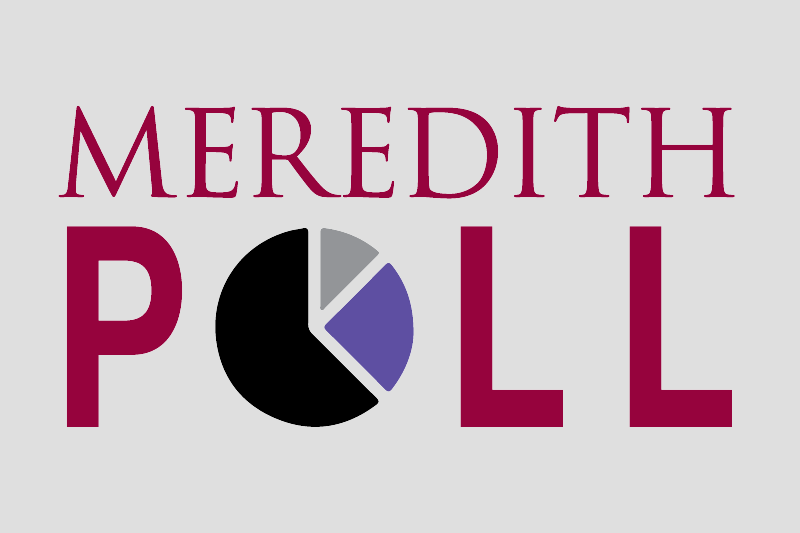The Meredith Poll Finds Many Factors Divide Voter Opinion in North Carolina
- Published

The latest edition of the Meredith College Poll, which surveyed opinions on current political issues, found that more than party affiliation divides North Carolina’s voters.
“Our results indicate that North Carolina is very divided about many of today’s important issues,” said Professor of Political Science David McLennan, one of the poll’s directors. “They are not just divided along political party lines, but also on factors such as age.”
The Meredith College Poll explored voter opinion on the direction of the country, interest in politics, the effect of political differences on personal relationships, and the causes of the political divide.
Direction of the Country
When asked if they are satisfied with the direction of the country, almost 80 percent of Democrats said they think the country is moving in the wrong direction, whereas Republicans are more evenly split between thinking the country is moving in the right direction versus the wrong direction. People of color in North Carolina are much more inclined to think the country is moving in the wrong direction with over 83 percent of African Americans and 75 percent of Hispanics being dissatisfied with the direction of the county, as compared to just over 60 percent of white voters. Women, on average, are more dissatisfied with the direction of the country than are men with almost 70 percent of women indicating that they are unhappy with government and politics.
Political Interest
The Meredith Poll asked North Carolinians if they were following politics more, less, or about the same since the election of Donald Trump. More than half said they were following politics more, and only eight percent said they were following politics less. Of the different groups surveyed, there were some interesting results. A large majority of Hispanics—70 percent—indicated that they were following politics more. Even Millennials, often thought to be more disengaged from politics than their older counterparts, reported being more engaged than before with over 51 percent of the group stating they followed politics more than they did before President Trump’s election.
Political Divisions
In this poll, citizens were asked if they believed political polarization had gotten worse since the election of Donald Trump as president. A large majority of North Carolinians think polarization has gotten worse in the last six months.
A majority of every group surveyed supported the idea that polarization was worse. Even with political affiliation, while it would be expected that a large majority of Democrats—just under 80 percent—think polarization is worse now than it was six months ago, Unaffiliated voters (58.6%) and Republican voters (55.5%) concur. Again, every group had a majority of its respondents indicating that polarization had gotten worse. It is worth noting, however, that almost 80 percent of African Americans and Hispanics indicated that polarization is worse.
Effect of Political Divide on Relationships
In addition to asking people their perceptions of polarization, voters were asked about how it impacts them. The poll asked them about engaging in political conversations with people different from themselves (on their support of President Trump). Results found that a majority of North Carolinians do not find talking about politics to people with different attitudes about the president to be positive. Only 1-in-5 citizens (20%) found talking politics with someone who differs in their views of President Trump would be “interesting and informative,” while over 30 percent of all citizens say they would simply not talk to people with different views. Women, in particular, find political conversations with people holding different beliefs about President Trump to be off-putting.
“One of the more troubling results from our poll is that not only are North Carolinians very polarized, but people are much less willing to talk to people who have different beliefs from themselves,” said McLennan. “As we try to resolve major policy differences and work toward solutions, this unwillingness to talk to the other side will have significant impacts.”
Causes of Political Polarization
The poll also explored what people thought were the causes of this divide. Poll respondents were able to state whether President Trump, Democrats, the Media, and Protestors were major reasons, minor reasons, or no reasons for the political divide in our country and state. President Trump and the media were identified by most North Carolinians as the major reasons for our polarized nation.
Of course, Democrats and Republicans had very different views of major reasons with almost 80 of Democrats identifying President Trump as a major reason for the divide and 82 percent of Republicans identifying the media as a major cause of divide in the country. On these issues, Millennials and the Silent Generation were very different. Almost 70 percent of Millennials identified President Trump as a major reason for the heightened partisanship, but less than 40 percent of this group blamed protestors. On the other hand, 42 percent of the Silent Generation said that President Trump was a major reason why there was increased polarization, but 54 percent stated that protestors were a major cause.
The Meredith College Poll also surveyed respondents on key issues, such as DACA, North Korea, the president’s handling of hurricane relief efforts, and more. View the full results
About The Meredith Poll
The Meredith College Poll conducted a combination poll consisting of 233 live caller respondents and 577 email respondents of registered North Carolina voters from September 17-30, 2017. The results reported have a margin of error of 3%. Meredith College students administer the survey as part of the College’s commitment to civic engagement.
News Director
316 Johnson Hall
(919) 760-8087
Fax: (919) 760-8330
PRINCETON REVIEW
U.S. NEWS
NICHE
PRINCETON REVIEW
U.S. NEWS
NICHE
3800 Hillsborough Street Raleigh, NC 27607-5298 | (919) 760-8600 Fax: (919) 760-8330 | © 2024 All Rights Reserved.